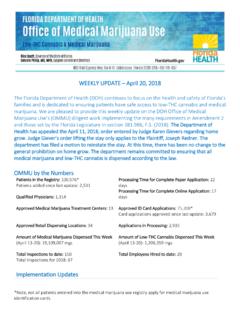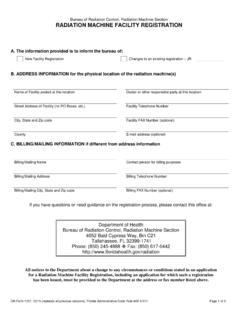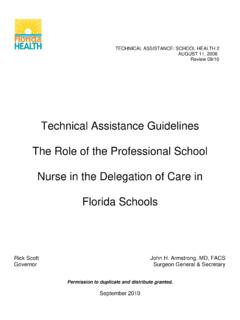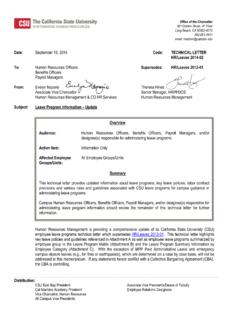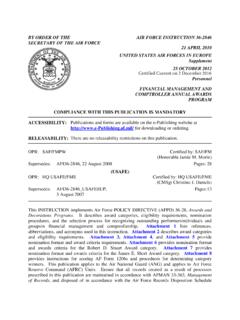Transcription of Attachment A Ryan White Program Definitions of Eligible ...
1 Attachment A. Ryan White Program Definitions of Eligible Services Core Medical Services Core medical services are a set of essential, direct health care services provided to persons living with HIV/AIDS and specified in the Ryan White HIV/AIDS Treatment Extension Act of 2009. a. Outpatient/ambulatory medical care includes the provision of professional diagnostic and therapeutic services directly to a client by a physician, physician assistant, clinical nurse specialist, nurse practitioner, or other health care professional certified in his or her jurisdiction to prescribe antiretroviral (ARV) therapy in an outpatient setting. These settings include clinics, medical offices, and mobile vans where clients generally do not stay overnight.
2 Emergency room services are not considered outpatient settings. Services include diagnostic testing, early intervention and risk assessment, preventive care and screening, practitioner examination, medical history taking, diagnosis and treatment of common physical and mental conditions, prescribing and managing medication therapy, education and counseling on health issues, well-baby care, continuing care and management of chronic conditions, and referral to and provision of specialty care (includes all medical subspecialties). Primary medical care for the treatment of HIV infection includes the provision of care that is consistent with the PHS's guidelines. Such care must include access to ARV and other drug therapies, including prophylaxis and treatment of opportunistic infections and combination ARV therapies.
3 B. Local AIDS pharmaceutical assistance (APA, not ADAP) are local pharmacy assistance programs implemented by Part A and grantees to provide HIV/AIDS medications to clients. These organizations may or may not provide other services ( , outpatient/ambulatory medical care or case management) to the clients that they serve through a Ryan White HIV/AIDS Program contract with their grantee. programs are considered APAs if they provide HIV/AIDS medications to clients and meet all of the following criteria: Have client enrollment process;. Have uniform benefits for all enrolled clients;. Have a record system for distributed medications; and Have a drug distribution system. programs are not APAs if they dispense medications in one of the following situations: As a result or component of a primary medical visit.
4 On an emergency basis (defined as a sing occurrence of short duration); or By giving vouchers to a client to procure medications. Local APAs are similar to AIDS Drug Assistance programs (ADAPs) in that they provide medications for the treatment of HIV disease. However, local APAs are not paid for with Part B funds earmarked for ADAP. Attachment A. c. Early intervention services include counseling individuals with respect to HIV/AIDS; testing (including tests to confirm the presence of the disease, to diagnose the extent of immune deficiency, and to provide information on appropriate therapeutic measures); referrals; other clinical and diagnostic services regarding HIV/AIDS; periodic medical evaluations for individuals with HIV/AIDS; and provision of therapeutic measures.
5 D. Oral health care includes diagnostic, preventive, and therapeutic services provided by a dental health care professional licensed to provide health care in the State or jurisdiction, including general dental practitioners, dental specialists, and dental hygienists, as well as licensed and trained dental assistants. e. Health insurance premium and cost sharing assistance is the provision of financial assistance for Eligible individuals living with HIV to maintain continuity of health insurance or to receive medical benefits under a health insurance Program . This includes premium payments, risk pools, co-payments, and deductibles. f. Home and community based services includes skilled health services furnished to the individual in the individual's home, based on a written plan of care established by a case management team that includes appropriate health care professionals.
6 Services include durable medical equipment; home health aide services and personal care services in the home; day treatment or other partial hospitalization services; home intravenous and aerosolized drug therapy (including prescription drugs administered as part of such therapy);. routine diagnostics testing administered in the home; and appropriate mental health, developmental, and rehabilitation services. g. Home health care is the provision of services in the home by licensed health care professionals, such as nurses, and the administration of intravenous and aerosolized treatment, parenteral feeding, diagnostic testing, and other medical therapies. h. Mental health services are psychological and psychiatric treatment and counseling services for individuals with a diagnosed mental illness.
7 They are conducted in a group or individual setting and provided by a mental health professional licensed or authorized within the State to render such services. Such professionals typically include psychiatrists, psychologists, and licensed clinical social workers. i. Medical nutrition therapy, including nutritional supplements, is provided by a licensed, registered dietitian outside of an outpatient/ambulatory medical care visit. The provision of food may be provided pursuant to the recommendation of a health care professional ( , physician, physician assistant, clinical nurse specialist, nurse practitioner) and a nutritional plan developed by a licensed, registered dietician. Nutritional counseling services and nutritional supplements not provided by a licensed, registered dietician shall be considered a support service and be reported under psychosocial support services and food bank/home- delivered meals, respectively.
8 Food not provided pursuant to a health care professional's recommendation and a nutritional plan developed by a licensed, registered dietician should also be considered a support service and is reported under food bank/home-delivered meals. j. Medical case management services (including treatment adherence) are a range of client-centered services that link clients with health care, psychosocial, and other services provided by trained professionals, including both medically credentialed and other health care staff. The coordination and follow up of medical treatments are a component of medical case Attachment A. management. These services ensure timely and coordinated access to medically appropriate levels of health and support services and continuity of care through ongoing assessment of the needs and personal support systems of the client and other key family members.
9 Medical case management includes the provision of treatment adherence counseling to ensure readiness for, and adherence to, complex HIV/AIDS treatments. Key activities include: (1). initial assessment of service needs; (2) development of a comprehensive, individualized service plan; (3) coordination of services required to implement the plan; (4) client monitoring to assess the efficacy of the plan; and (5) periodic reevaluation and adaptation of the plan, at least every 6 months, as necessary over the life of the client. It includes client-specific advocacy and review of utilization of services. This includes all types of case management, including face-to-face meetings, telephone calls, and any other forms of communication.
10 K. Substance abuse services (outpatient) are medical or other treatment and/or counseling to address substance abuse problems ( , alcohol and/or legal and illegal drugs) in an outpatient setting by a physician or under the supervision of a physician, or by other qualified personnel. Support Services Support services are a set of services needed to achieve medical outcomes that affect the HIV- related clinical status of the person living with HIV/AIDS. l. Case management services (non-medical) include advice and assistance in obtaining medical, social, community, legal, financial, and other needed services. Non-medical case management does not involve coordination and follow-up of medical treatments. m. Emergency financial assistance is the provision of one-time or short-term payments to agencies or the establishment of voucher programs when other resources are not available to help with emergency expenses related to essential utilities, housing, food (including groceries, food vouchers, and food stamps), transportation, and medication.


